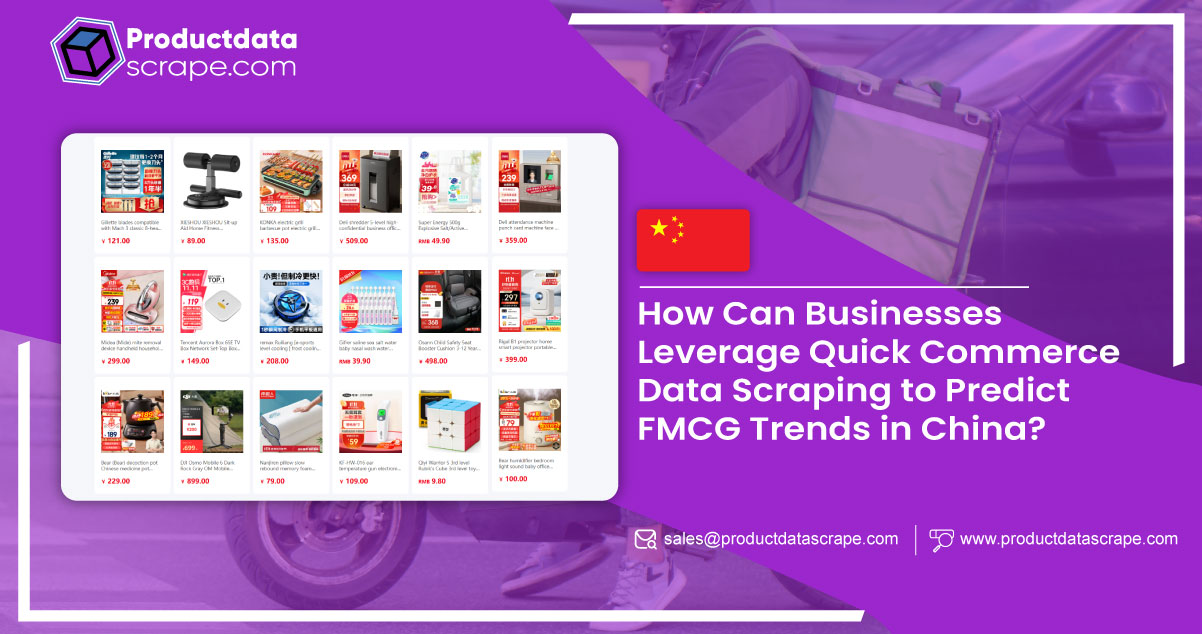
Introduction
The rapid growth of quick commerce (q-commerce) has significantly transformed the landscape
of the Fast-Moving Consumer Goods (FMCG) sector in China. As consumers increasingly seek
convenience and speed in their shopping experiences, the demand for faster deliveries of
everyday products, including groceries, household goods, and personal care items, has
skyrocketed. This shift is particularly evident in China, where digital transformation and e-
commerce have advanced at an unprecedented rate. In this context, Quick commerce data
scraping for FMCG trends in China plays a crucial role in understanding FMCG trends and
gaining a competitive edge in China's evolving market.
The role of data scraping has grown exponentially as businesses seek to capture real-time
insights from a variety of digital platforms. Quick commerce, known for its emphasis on fast
delivery, has disrupted traditional FMCG supply chains. Real-time grocery data scraping allows
businesses to instantly track inventory and pricing trends, enabling them to adapt to changing
demands. Online platforms, including e-commerce websites, mobile apps, and delivery services,
generate vast data that can be harnessed to understand consumer behavior, track inventory
levels, monitor pricing trends, and gain insights into product popularity. This wealth of data can
be extracted through Web scraping for FMCG insights, providing companies with the tools to
stay ahead of trends and adjust their strategies accordingly.
The Rise of Quick Commerce in China’s FMCG Market
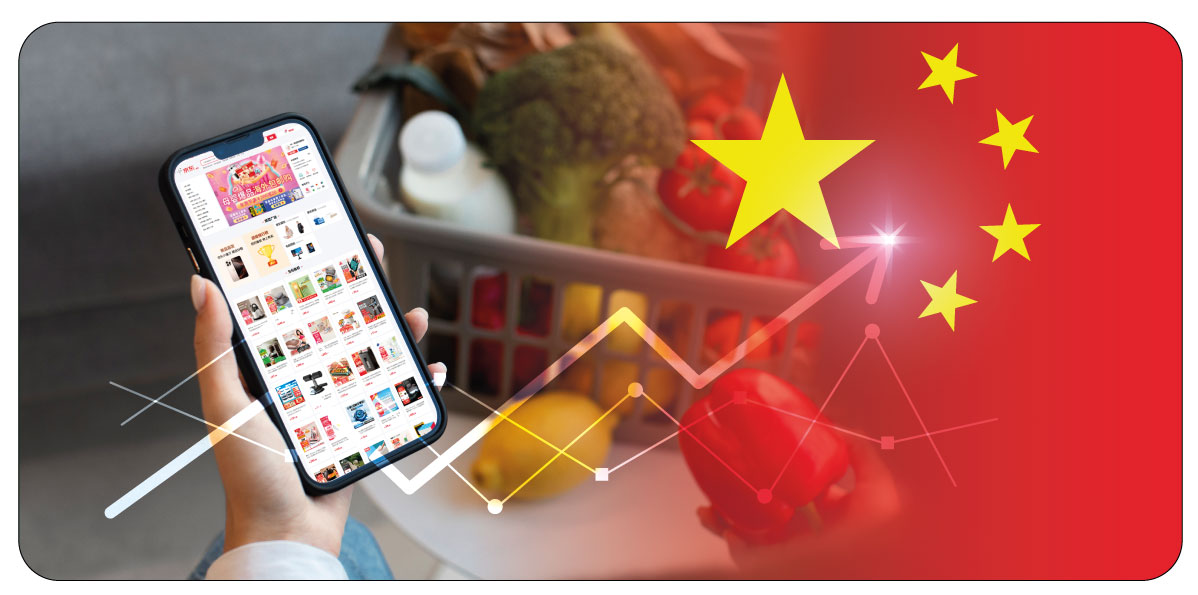
In China, the FMCG industry has been experiencing rapid changes driven by technological advancements, urbanization, and evolving consumer preferences. The rise of quick commerce is a testament to the country’s digital and logistical capabilities, enabling businesses to meet the growing demand for ultra-fast deliveries. Companies like Meituan, Ele.me, and JD Daojia have emerged as key players in the Chinese quick commerce landscape, catering to a market that demands goods within hours, if not minutes. This rapid growth has further emphasized the importance of scraping Quick Commerce data to understand the dynamics of the industry.
The FMCG sector in China is highly competitive, with numerous domestic and international players vying for market share. As more consumers embrace the convenience of online shopping, understanding the trends that shape their purchasing decisions has become more critical than ever. China quick commerce data extraction has become a crucial real-time method for tracking consumer behavior and preferences. Q-commerce platforms, which offer same-day or next-day delivery for various products, including food, beverages, household items, and health and beauty products, have become an essential part of the FMCG ecosystem.
In this fast-paced environment, online retail data scraping in China helps businesses stay ahead by providing insights into competitor strategies, price fluctuations, product availability, and consumer sentiment. Harnessing such data allows brands to optimize their offerings, improve customer experiences, and stay competitive in an increasingly digital landscape.
Leveraging Quick Commerce Data Scraping for FMCG Insights in China
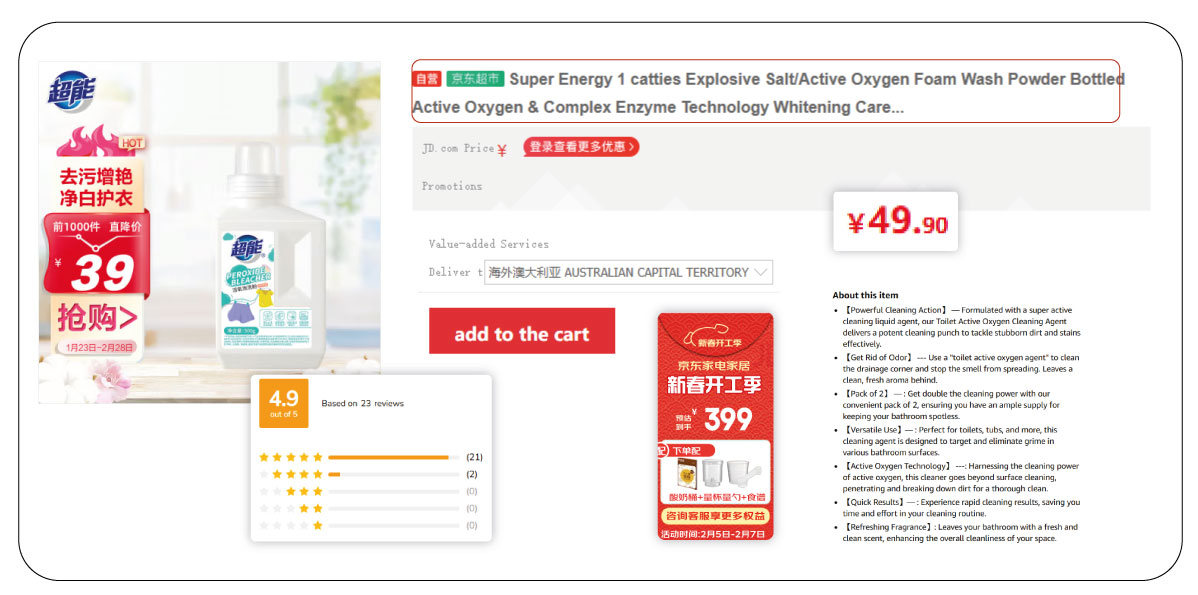
To stay competitive in the rapidly evolving q-commerce landscape, FMCG companies need to leverage data scraping techniques to extract valuable insights from online sources. By scraping data from e-commerce platforms, mobile apps, delivery services, and social media channels, businesses can comprehensively understand FMCG trends and consumer behavior in real-time. This data can include product availability, pricing fluctuations, promotions, customer reviews, and delivery times, all of which contribute to shaping the demand for FMCG products in China.
Grocery delivery data collection in China is crucial in understanding consumer preferences for food and household items, helping businesses anticipate demand and improve their offerings. One of the key advantages of web scraping is its ability to gather data at scale. In China, where the pace of business is fast and trends can change rapidly, having access to real-time information is invaluable. Web scraping fresh food delivery data in China allows businesses to stay ahead by tracking fluctuations in the availability and pricing of fresh produce, ensuring they can cater to consumers' needs at any time. Web scraping grocery & gourmet food data provides insights into what food categories are gaining popularity, which in turn helps businesses adjust their stock and marketing strategies to target the right products at the right time.
Scraping q-commerce data allows companies to track shifts in consumer preferences, monitor the effectiveness of promotional campaigns, and adjust their product offerings to meet changing demands. For example, a company selling personal care products can scrape data from quick commerce platforms to identify which products are experiencing increased sales during a specific season or event. This allows them to optimize their inventory and marketing strategies.
Insights into Consumer Behavior

In China’s rapidly evolving FMCG market, consumer preferences are constantly changing. With the rise of younger, tech-savvy consumers, including millennials and Gen Z, brands must remain agile and responsive to shifting trends. Data scraping offers invaluable insights into consumer behavior, enabling businesses to understand which products are in demand, how customers engage with brands, and which attributes drive purchasing decisions.
By scraping data from q-commerce platforms, businesses can track customer reviews, ratings, and feedback on FMCG products. This data can provide insights into product quality, customer satisfaction, and emerging preferences. For example, suppose consumers consistently rate a specific food product highly during certain festivals. In that case, it may signal a growing demand, prompting businesses to increase their stock or adjust their marketing efforts.
Moreover, data scraping can inform businesses about seasonal or event-driven purchasing patterns. For instance, consumer demand for specific FMCG products, such as health supplements or snacks, may increase during major national holidays or events. By scraping data from platforms like Meituan and Ele.me, businesses can anticipate these shifts in demand and adjust their production and supply chain strategies accordingly.
Price Monitoring and Competitive Intelligence
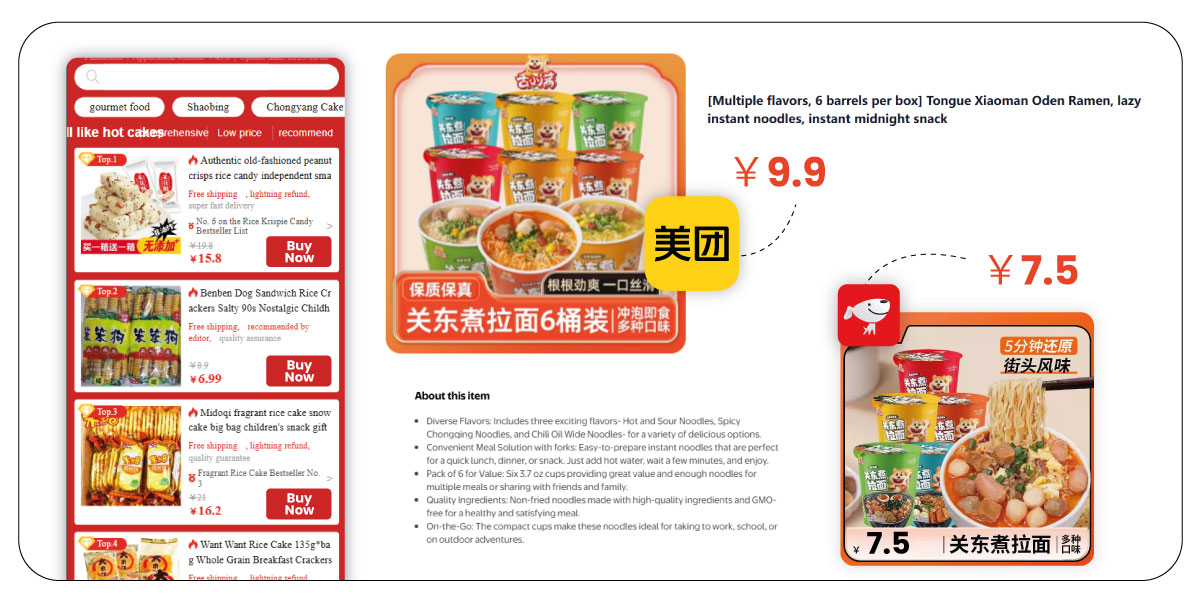
Price monitoring is crucial to any successful FMCG strategy, particularly in a market as competitive as China. Price sensitivity is a key factor influencing consumer behavior with many local and international players. Data scraping efficiently allows businesses to track real-time pricing trends across a wide range of products.
By scraping quick commerce platforms for pricing data, FMCG companies can identify trends in product prices, uncover opportunities for competitive pricing, and adjust their pricing strategies based on market conditions. For example, suppose a competitor lowers their prices for a popular snack item. In that case, businesses can use data scraping to monitor the change and adjust their prices to remain competitive without sacrificing profitability.
In addition to tracking prices, data scraping provides insights into promotional activities and discounts. Companies can track promotional offers, seasonal discounts, and flash sales, which are common in the quick commerce industry. By analyzing this data, businesses can plan their promotions and sales strategies to capture market share during peak shopping.
Inventory and Supply Chain Optimization
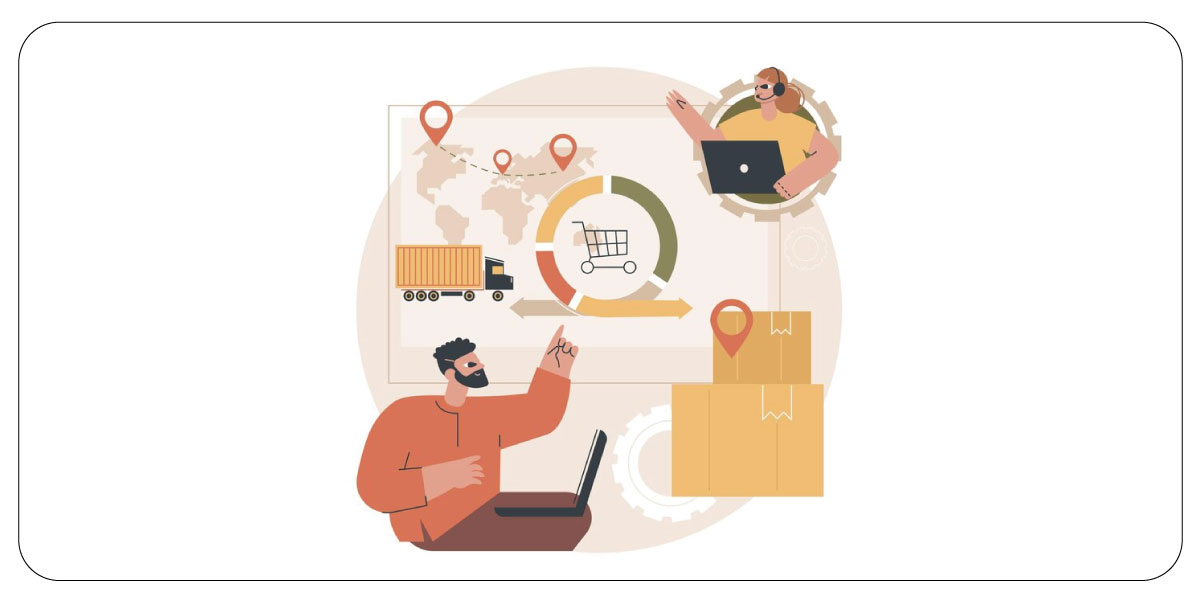
Inventory management and supply chain efficiency are essential to success in the FMCG sector. With the rise of quick commerce, real-time data is increasingly important in maintaining optimal inventory levels and ensuring fast deliveries. Data scraping can help businesses track product availability, monitor stock levels, and identify trends in product demand. By collecting data from Q-commerce platforms, businesses can gain insights into which products are frequently out of stock and which are experiencing slow turnover.
In addition to monitoring product availability, data scraping can help businesses optimize their supply chains. By tracking delivery times, fulfillment rates, and other key performance indicators, businesses can identify areas where their supply chain operations need improvement. For example, suppose a particular region experiences delays in delivery times for FMCG products. In that case, businesses can use data scraping to identify the root cause and take corrective actions to improve their logistics.
The Role of Social Media in FMCG Trends

Social media plays a significant role in shaping FMCG trends in China. With the rise of platforms like WeChat, Douyin (TikTok), and Xiaohongshu (Little Red Book), consumers are increasingly turning to social media for product recommendations, reviews, and inspiration. Data scraping can help businesses track social media discussions around FMCG products, monitor influencer activity, and identify emerging trends. eCommerce dataset scraping allows companies to extract valuable insights from user interactions and conversations across these platforms, giving businesses a competitive edge in understanding consumer preferences.
By scraping social media platforms for relevant data, businesses can identify which FMCG products generate buzz and which influencers drive conversations. This information can be used to optimize marketing strategies, partner with influencers, and create targeted campaigns that resonate with consumers. Additionally, e-commerce data extraction from social media helps businesses track real-time sentiment, providing valuable feedback on product quality, customer satisfaction, and brand perception. By staying on top of these trends, companies can adjust their offerings to meet the needs of their audience better and capitalize on emerging opportunities in the market.
Conclusion
The FMCG sector in China is undergoing rapid transformation, driven by the growth of quick commerce and the increasing demand for convenience and speed. Extracting grocery & gourmet food data provides businesses with a powerful tool to stay competitive in this evolving market. Companies can make data-driven decisions that optimize their operations and enhance customer satisfaction by extracting real-time insights into consumer behavior, pricing trends, inventory management, and supply chain performance.
As China’s FMCG market continues to evolve, data scraping will play an increasingly vital role in helping businesses stay ahead of emerging trends, anticipate shifts in demand, and make informed strategic decisions. Businesses can unlock new opportunities, streamline operations, and drive profitability in an increasingly competitive marketplace by leveraging the wealth of data available through quick commerce platforms.
At Product Data Scrape, we strongly emphasize ethical practices across all our services, including Competitor Price Monitoring and Mobile App Data Scraping. Our commitment to transparency and integrity is at the heart of everything we do. With a global presence and a focus on personalized solutions, we aim to exceed client expectations and drive success in data analytics. Our dedication to ethical principles ensures that our operations are both responsible and effective.







































.webp)




.webp)
.webp)
.webp)